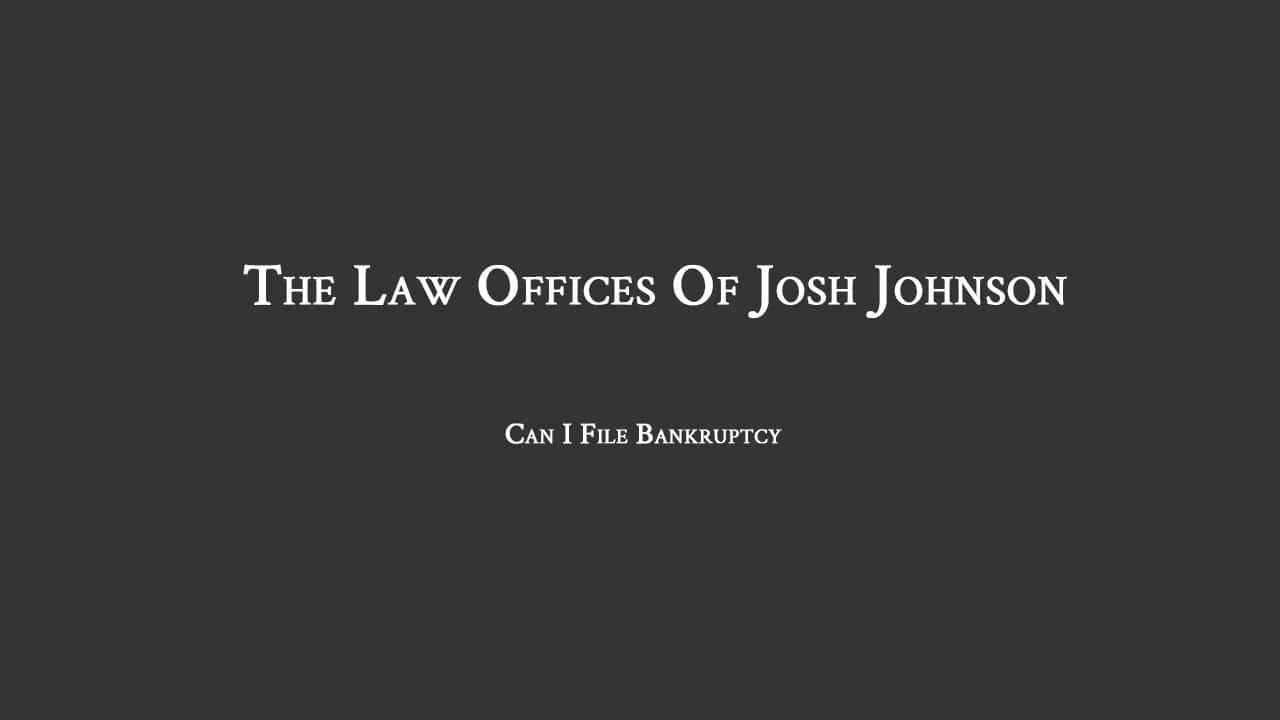Can I File Bankruptcy?
Can I File Bankruptcy?
Making the decision to file bankruptcy can be a difficult one. There is a lot to consider prior to filing bankruptcy, including whether you are eligible to file, effects the filing may have your relationship with certain creditors and the effect it may have on your credit score. While there are certainly drawbacks to filing that will carry some weight for years to come, many people can find significant relief in filing for personal bankruptcy.
The purpose of bankruptcy is to provide individuals a financial fresh start and allow them to move on with their lives unencumbered by debts and obligations that they cannot meet or pay. Bankruptcy is not the best option for everyone and for every situation but under the right circumstances, bankruptcy can be a valuable tool to help debtors start over.
There are several legitimate reasons you should consider filing for bankruptcy. Keep reading to learn about those reasons and to see if you qualify for bankruptcy.
Should I File For Bankruptcy?
Filing for bankruptcy may be the right option if you:
- Have suffered a job loss
- Have medical debt
- Are getting a divorce
- Are currently being sued by creditors
- Own a home that’s threatened with foreclosure
- Can only use a credit card to pay for your expenses
- Have to pay off one credit card with another
- Need to withdraw money from a 401k account to pay bills
- Don’t have many assets
- Have debts that can be discharged
In cases where a debtor has significant assets, has a steady source of income and/or can repay some or all of what you owe, a Chapter 13 bankruptcy may be a better option. You’re still declaring bankruptcy under Chapter 13, but your debts will only be discharged after you successfully complete a payment plan made with the bankruptcy trustee and the court.
Do I Qualify For Bankruptcy?
To declare bankruptcy, you must meet specific requirements, depending on which type of personal bankruptcy you’re filing for (Chapter 7 or 13). As stated before, Chapter 13 bankruptcy requires that you have a reliable source of income in which to pay off your debts. On the other hand, if you find yourself in debt and see no reasonable way to pay off your debts and have fairly minimal assets, you’ll want to consider Chapter 7 bankruptcy.
It is certainly worth consulting with a bankruptcy attorney to help determine whether filing a bankruptcy is the right decision for you, which type of bankruptcy to file for, and the effect it may have both in the short and long term.
Qualifications For Chapter 7 Bankruptcy
Chapter 7 bankruptcies are restricted to individuals, married couples, or small business owners. There are three major qualifications:
- Passing a “means test,” which compares your income from the previous six months to what you owe on debts. The higher your income relative to accrued debt, the less likely you’ll be granted Chapter 7.
- Not having completed Chapter 7 in the past eight years or a Chapter 13 within the past six years.
- Not having a dismissed Chapter 7 or 13 filing in the last 180 days due to failure to appear in court or comply with court orders, or if you voluntarily dismissed your filing because creditors sought relief in an effort to recover property they had a lien on.
If you meet the requirements for bankruptcy, then you can continue the filing process. Filing for bankruptcy may take up to six months and includes credit counseling, gathering paperwork, and getting a firm grasp of your debts, assets and income. You will likely need to get a credit report and spend some time gathering the various paperwork needed to file. When you file a bankruptcy you work closely with your attorney to make sure you are getting what the court needs to process your case.

Qualifications for Chapter 13 Bankruptcy
Much like Chapter 7, Chapter 13 bankruptcies are only available for individuals, married couples, and unincorporated businesses. Filing for a Chapter 13 Bankruptcy requires that:
- An individual’s unsecured debts are less than $394,725 and that their secured debts are less than $1,184,200.
- In the past 180 days, the debtor did not have a prior bankruptcy petition dismissed due to failure to appear before the court or comply with the order of the court, or that they voluntarily dismissed the petition after a creditor sought relief from the bankruptcy court.
- The debtor has not undergone credit counseling from an approved credit counseling agency within the last 180 days.
Final Thoughts
If you feel that you’re in over your head with debt, then filing for bankruptcy may be worth considering. Declaring bankruptcy isn’t always an easy choice, but it can offer you a fresh start and a way to move towards financial security. Getting a free consultation with a bankruptcy lawyer is often the best first step to determine if your eligible for bankruptcy and if it is a good match for your situation.
We can help. Contact us to begin discussing your case.
Sitemap
Minneapolis Office
310 Fourth Avenue S #7000
Minneapolis, MN 55415
(612) 730-1738
St Paul Office
656 Selby Avenue Suite 230
St. Paul, MN 55104
(651) 785-5342
Copyright © 2020, Josh Johnson Attorney at Law


